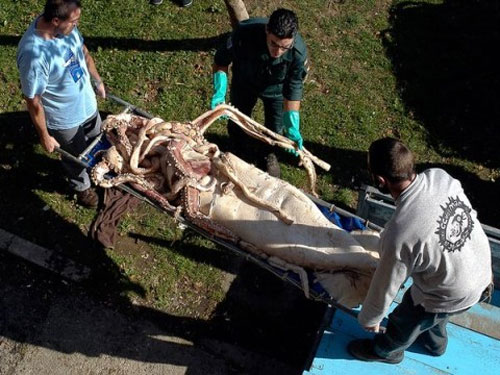Find out why the giant squid died after 11 years
When the corpses of giant squid were found in Spain more than a decade ago, scientists suspected that loud noises from boats damaged them. Now, it has been clarified.
A new study says low-frequency sound waves from human activities adversely affect squid and other mollusks , not just whales and mammals, those that have has been significantly affected so far.
Research results show that sound pollution in the ocean has a much greater impact than our previous way of thinking, Michel Andre, head of research, scientist on water ecology at the University of Engineering. Catalonia in Barcelona (Spain), said.
'Noise pollution in the ocean has a huge impact on whales and dolphins (species using sound navigation systems to find their way or hunt) . but this is the first study for see serious impacts on molluscs, an unknown group of aquatic species that depend on sound to live , 'Andre said.

The giant squid was found in 2003. (Source: National Geographic ).
Around 2000, many giant squid bodies were found off Spain's Asturias province. Their corpses appear shortly after boats use air guns to create low-frequency sound pulses in this area for the purpose of oil and gas exploration.
Scientists studied the corpses of these giant squid and found evidence that their bodies were severely damaged : the cortex was crushed, the muscle was bruised, the injury in the balancing bag . These balance bags are very important to mollusks, located at the back of the giant squid eye, they help it balance and position.
At that time, biologist Angel Guerra was suspicious - but unable to prove - that the sound from the probes had harmed mollusks and other aquatic species.
' With this research, we now have evidence that low-frequency sound waves can damage mollusks ,' Guerra said. The study will be published in the upcoming issue of Frontiers in the journal. Ecology and the Environment.
The team examined the effect of low-frequency sound waves on 87 molluscs of four species: two squid species, one octopus species and one cuttlefish species. In two hours, these animals suffered from sounds of a magnitude of 157 - 175 decibels and a wavelength of 50 - 400 Hertz.
This intensity and wavelength is often seen in the noises caused by human maritime activities, such as checking military submarine locator equipment, natural oil and gas exploration efforts. The results showed that the animals in the experiment died either immediately or within 96 hours.
Those who die immediately show injuries in the balance system. In particular, the micro-hair-like system in the airbag cells - which bends when molluscs move in water and helps them keep balance - disappears.
Those who live longer will suffer other injuries, such as those seen in balance bags. ' This is a typical process in terrestrial mammals and birds when subjected to high-intensity sounds: auditory lesions followed by peripheral lesions, causing worsening injuries. worse , 'Andre explained.
Although the animals in this experiment were several times smaller than giant squid, they showed similar phenomena that happened with giant squid.
- Graveyard squid at a depth of 1,000 meters under the sea
- Revealing the mystery of giant squid
- Giant demon squid: Possessing strong bite force like lion beast!
- Hydroponic squid is nearly 10 meters long, weighs 181.4kg
- 3 species of squid are labeled giant monsters from birth
- Giant squid appeared again, Japanese people feared
- Giant squid wounded by skateboarder surfers on shore
- Giant squid is back in Japan
- Video: Rare and precious 4m long ink swim along Japanese seaport
- Huge giant squid by bus can hide under deep sea
- Giant squid is 5.5 meters long and Irish fishing net
- Giant squid in Japan
 Animal 'suffering' after hibernation
Animal 'suffering' after hibernation Why do goats climb well?
Why do goats climb well? Scientists were surprised to see chimpanzees eating turtles
Scientists were surprised to see chimpanzees eating turtles Giant catfish died deadly due to drought in Thailand
Giant catfish died deadly due to drought in Thailand